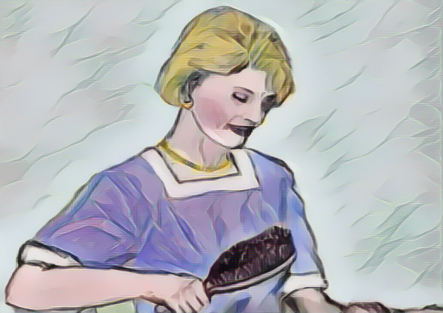(gap: 2s) Now, as I sit by the window in my peaceful cottage, the garden bathed in the gentle glow of the late afternoon sun, I find myself reflecting upon the years that have passed—years spent in the service of families, both distinguished and modest, as a nanny. I am now in my late sixties, long retired, and the laughter of children is but a distant echo in my memory. Yet, those days remain as vivid as the scent of lavender drifting through the summer air. Before I married and raised my own sons, I spent nearly eight years as a nanny, both in the rolling countryside of England and in distant lands, and I thought you might enjoy hearing some of my adventures and the lessons I learned along the way.
Each household I entered was a world of its own, with its particular rules, rhythms, and peculiarities. Some families, I recall, were most insistent in their opposition to corporal punishment. The parents, often gentle people with modern ideas, believed that a child’s spirit should never be broken by a smack. I respected their wishes, of course, though I must confess there were moments—oh, so many moments—when my hand fairly longed to deliver a swift, corrective tap. In those homes, the children were often lively, sometimes unruly, and the days were filled with negotiation and gentle redirection. I remember little Sophie, with her golden curls and mischievous smile, who once painted the nursery cat blue with her watercolours. Her mother and I spent the afternoon scrubbing both cat and child, our laughter mingling with exasperation. There was a certain charm in these households, a sense of freedom and creativity, though I sometimes wondered if a firmer hand might have brought a touch more order.
In other positions, the matter of discipline was left to my discretion. Most parents permitted only a hand spanking, and I must say, my hand was not a gentle one—at least, so my young charges would tell you! I recall the sturdy oak staircase in the Wilton house, where the twins, Henry and George, would slide down the banisters in defiance of all rules. A sharp word and, on occasion, a well-smacked bottom would restore peace, and the boys would return to their lessons with flushed cheeks and a new resolve to behave. There was a certain justice in these moments, a sense that boundaries, once enforced, allowed the children to feel safe and cherished. I always made sure to comfort them afterwards, for discipline, I believe, should never be without kindness.
There were, too, those rare households where the parents were most enthusiastic about corporal punishment and gave me complete authority in such matters. In these homes, I was introduced to the hairbrush—a tool both feared and respected. It was an older nanny, Mrs. Pritchard, who first recommended it to me. She was a formidable woman, with a voice like thunder and a heart of gold, and we would often meet in the park, our charges tumbling about on the grass. “There is nothing better than the back of the brush on their bottom to make them behave,” she would say, her eyes twinkling with mischief.
Taking her advice, I purchased a Victorian ebony hairbrush from a little antiques market in Bath. It was a handsome thing, heavy and smooth, and it soon became my trusted companion. The mere sight of it was often enough to quell mischief, but on the rare occasions it was needed, its effect was swift and memorable. I remember the day young Emily, a spirited child with a fondness for climbing trees, decided to sneak out after dark to rescue a stranded kitten. Her parents were at their wits’ end, but after a brief encounter with the hairbrush, Emily’s nocturnal adventures ceased. The punishment was never cruel, but it was firm, and the children always knew that I cared for them deeply. In fact, many of my former charges have written to me over the years, recalling those days with a fondness that warms my heart.
Some families, I found, struggled with discipline, feeling that their own efforts were in vain. I remember the Bradshaws, whose three boys were a whirlwind of energy and mischief. Their mother, a gentle lady with a soft voice, confided in me that smacking seemed to have no effect. Yet, after a single, well-administered session with the hairbrush, the boys became models of decorum—at least for a time! There is a certain wisdom, I think, in knowing when to be firm and when to be gentle, and it is a lesson I carried with me throughout my career.
Yet, not all situations were so straightforward. I once found myself employed by a minor member of the aristocracy—a grand house with echoing halls, polished floors, and a nursery at the very top of a winding staircase. Here, corporal punishment was not only approved of, but considered essential to the upbringing of young gentlemen. However, I was not permitted to administer it myself. Instead, whenever there was mischief in the nursery, I would descend the great staircase to consult with the children’s father, a stern but fair man with a deep, booming voice. If he agreed that a spanking was warranted, I would be instructed to take the offending child—there were two little boys, both with unruly hair and a talent for mischief—to the bathroom. There, we would wait in solemn silence for Father to arrive, slipper in hand.
The ritual was always the same. I would leave the child with his father, the door closing softly behind me, and the sounds that followed—sharp smacks, muffled cries, and the echo of discipline—would drift down the corridor. Afterwards, a tearful but contrite boy would be returned to my care, and I would comfort him, tucking him into bed with a gentle word and a cool hand on his brow. Bedtime, even in the middle of the day, was the usual consequence, and though the punishment was severe, the boys loved and respected their father deeply. There was a sense of order in that household, a knowledge that actions had consequences, and I believe it helped the children grow into kind and responsible young men.
My days as a nanny were filled with routines and rituals—morning lessons at the big oak table, walks in the park with the pram, afternoons spent reading stories by the fire, and evenings singing lullabies as the sun set behind the garden wall. There were moments of laughter and tears, triumphs and tumbles, and always the quiet satisfaction of knowing I had helped shape young lives. The relationships I formed—with the children, their parents, and even the family pets—were precious to me, and I look back on them now with a gentle nostalgia.
I married rather late, as was sometimes the way in those days, at the age of twenty-five. I went on to have two boys of my own, and in the role of Mummy rather than Nanny, I found myself with complete freedom in matters of discipline. I began, as I had with my charges, with a few mild hand spanks when they were very small, but as soon as they started school, I brought out my trusty old hairbrush. Yet, I always remembered the lessons of my nannying days: that discipline, to be effective, must be tempered with love, and that every child, no matter how mischievous, longs to be understood and cherished.
(pause) Now, as I watch the shadows lengthen across the lawn, I am grateful for those years—the laughter, the tears, the lessons learned. Childhood is a fleeting thing, and it is our duty, as grown-ups, to guide the young with firmness and affection, to teach them right from wrong, and to send them out into the world with courage and kindness in their hearts. (long pause) And so, I remember the slipper, the hairbrush, and all the little adventures of the nursery, with a smile and a sigh, and a hope that the children I cared for look back on those days as fondly as I do.








